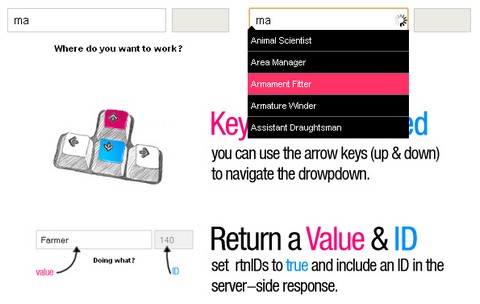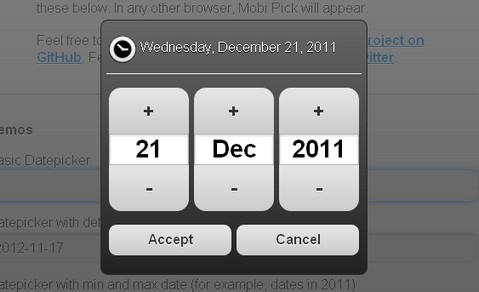Subpug brings all your favourite websites, blogs and news sources into one convenient place. Subpug is a feed reader, also known as an Atom or RSS reader. It’s totally free and there’s no sign up.
Subpug users don’t even need to give us their email addresses – just click through to the app and your “account†is automatically created inside your web browser. If you need to view your data subscriptions) on another device (like an iPad), Subpug can synchronise your subscriptions back to the server and email you a link that provides access to those subscriptions on another device.

Requirements: –
Demo: http://www.subpug.com/
License: License Free
jQuery Masonry is a dynamic grid layout plugin for jQuery. Think of it as the flip-side of CSS floats. Whereas floating arranges elements horizontally then vertically, Masonry arranges elements vertically, positioning each element in the next open spot in the grid. The result minimizes vertical gaps between elements of varying height, just like a mason fitting stones in a wall.
It’s suitable for websites with a stream of pictures. Users can browse the pictures in a seamless way without clicking “next page”. We have found the following 15 Great Examples of Websites using jQuery Masonry. I hope it can gives you some inspirations for designing similar style websites.



Read the rest of this entry »
Batman.js is a framework for building rich single-page browser applications. It is written in CoffeeScript and its API is developed with CoffeeScript in mind, but of course you can use plain old JavaScript too.
It got a stateful MVC architecture, a powerful binding system, routable controller actions, pure HTML views, toolchain support built on node.js and cake. The APIs are heavily inspired by Rails and designed to make Rails devs feel right at home. It has been tested on Chrome, Safari 4+, Firefox 3+, and IE 7+ for compatibility.

Requirements: –
Demo: http://batmanjs.org/
License: MIT License
Are you amazed by features like drag and drop, customizable content and AJAX? Learn how you can combine them to create a customizable website layout, saving preference using cookies.
DevHeart has written a very nice tutorial teaching us how to create a Customizable Layout using Drag and Drop. The approach includes using jQuery along with the jQuery UI Sortable plugin for drag and drop functionality and the jQuery Cookie plugin for storing item positions.

Requirements: jQuery Framework
Demo: http://devheart.org/articles/jquery-customizable-layout…
License: License Free
AUSU Ajax Auto Suggest jQuery Plugin has the usual functionality with a little extra flexibility: multiple instances, passing custom parameters, the id and the value are returned, keyboard-controlled, and a few others… Almost anything you need from an autosuggest plugin you can do with the built-in options! The CSS file is small and very easily changed.
It has been tested on mordern browsers (Firefox 3, Internet Explorer 8, Opera 11, Safari 5 & Chrome). It has also been tested on IE7 & IE6 without any issue.

Requirements: jQuery Framework
Demo: http://oslund.ca/demos/ausu/
License: License Free
Merry Christmas and Happy new year to you all! The holiday season is at its peak and for some lucky people in weather appropriate climates, winter is in full swing. Do you like snow? How about putting some snow on your website with a couple of simple lines of code?
Design Shack has shared a super simple CSS technique that you can use to Make It Snow on Your Website with CSS Keyframe Animations. It will only take you a few minutes at the most and it serves as a great introduction to using multiple background images and keyframe animations in CSS.

Requirements: CSS Keyframe Support
Demo: http://designshack.net/tutorialexamples/letitsnow/index.html
License: License Free
A couple of months ago, Ian Lunn has created a jQuery Vertical Parallax Demo that manipulated CSS to make multiple backgrounds move at different speeds relative to the users movement of the scroll bar. This type of effect is slowly appearing across various websites on the web, achieved using many different techniques. Nikebetterworld took the idea to a new level.
Now Ian Lunn has written a tutorial that took the original jQuery Parallax script he wrote and recreated a webpage with Nikebetterworld Parallax Effect. And also, he has turned the tutorial into a jQuery Plugin, you can download and fork it on Github.

Requirements: jQuery Framework
Demo: http://www.ianlunn.co.uk/demos/recreate-nikebetterworld-parallax/
License: GPL, MIT License
Mobi Pick is an Android-style datepicker widget for jQuery Mobile. It uses the date library XDate and allows progressive enhancement for date input fields using Modernizr. It is free for download and released under MIT license.
If Mobi Pick does not suit your porject, you can also take a look at other datepicker and calendar components we have mentioned before.

Requirements: jQuery Mobile
Demo: http://mobipick.sustainablepace.net/
License: MIT License
Web browsers are becoming more and more powerful, and new APIs like the Web Audio API and Audio Data API are making the web an ever more interesting and dynamic place.
At ofmlabs they are invested in improving the state of audio on the web, and with JSMad showed that decoding audio purely in JavaScript is possible thanks to these APIs and the hard work of browser makers and spec authors.
And now they have done it again. Introducing alac.js, a port of the recently open sourced Apple Lossless decoder to JavaScript. Now it is possible to play MP3 and Apple Lossless even in browsers without native support. Check out the suite of JavaScript audio codecs to hear JavaScript rocking out!

Requirements: –
Demo: http://codecs.ofmlabs.org/
License: GPL, Apache 2 License
Ember.js is a JavaScript framework for creating ambitious web applications by eliminating boilerplate and providing a standard application architecture.
Ember.js, like some other modern JavaScript frameworks, works a little differently. Instead of the majority of your application’s logic living on the server, an Ember.js application downloads everything it needs to run in the initial page load. That means that while your user is using your app, she never has to load a new page and your UI responds quickly to their interaction.
One advantage of this architecture is that your web application uses the same REST API as your native apps or third-party clients. Back-end developers can focus on building a fast, reliable, and secure API server, and don’t have to be front-end experts, too.

Requirements: JavaScript Framework
Demo: http://www.emberjs.com/
License: License Free















